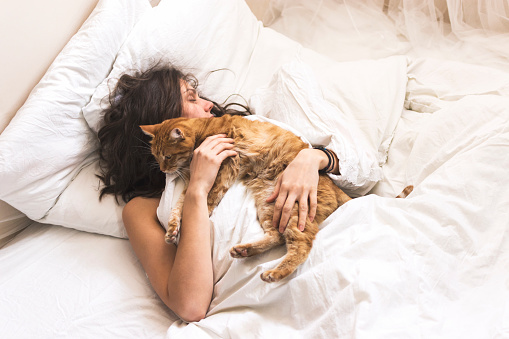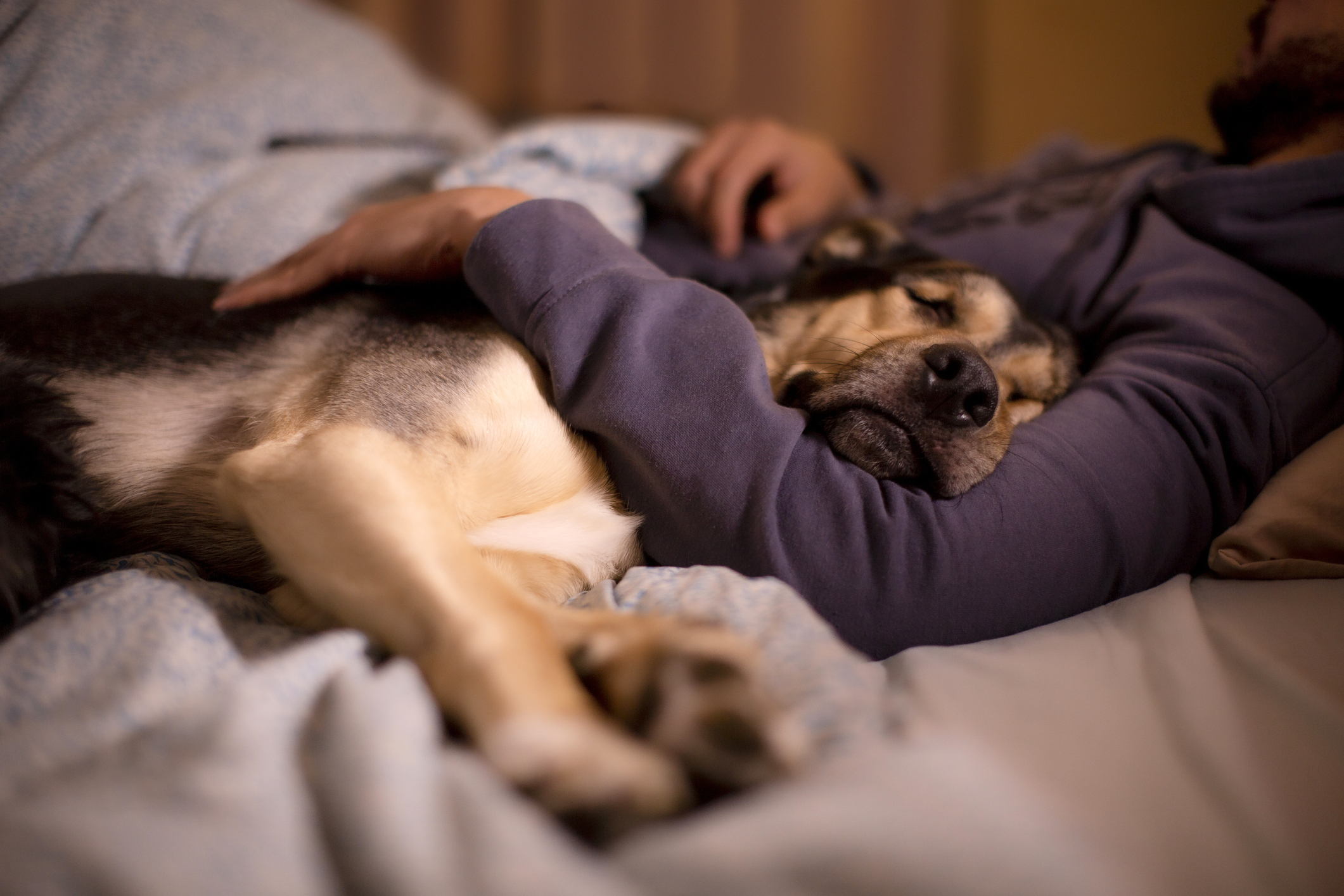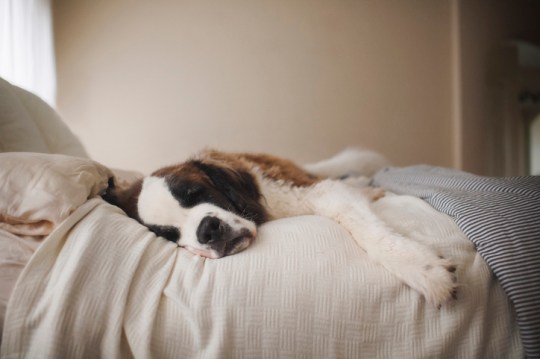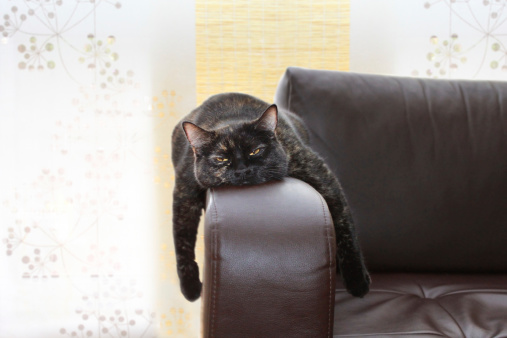
When heading off for a night’s slumber, does your pet follow?
Perhaps the cat curls up at the end of your bed. Maybe the dog dives under the duvet or pops their head on your pillow. Alternatively, your pet might have their own devoted sleeping space.
But if you do share your bed with Fluffy or Fido, what what does science suggest is best practice?
Pets increasingly have new roles and expectations in society.
Dogs, cats and a multitude of other companion animal species have become family members, a role far removed from their original purposes as protectors, hunting partners, pest-exterminators and in some cases, food sources.
Owners now spend much more time in close contact with their pets, which confers many benefits. Positive associations with pets are linked with improved health, social contact, physical activity, and decreased perceptions of loneliness.
While people typically share living spaces with their pets, sharing beds is a much more intimate proposition.
Nevertheless, research shows that of the estimated 90 million European households who own a least one pet, 45% of dogs and 60% of cats are allowed on the bed – and 18% of dogs and 30% of cats sleep with their owner inside the covers.
While it might be enjoyable and relaxing to share resting time with your pet, it could come with risks to pet and human health, not to mention impacts on sleep hygiene and human relationships too.
Disturbed Sleep
One challenge of sharing your bed with your pet could be disturbed sleep. The movement of sleeping partners (two or four-legged) may lead to reduced sleep efficiency, although a bed large enough to accommodate all can mitigate this.
Encouraging your pet to sleep elsewhere, but within the bedroom could also be beneficial if sleep disturbance is affecting your wellbeing. Our pets also need quality sleep, so their own sleeping space might be good for them too.
But shared sleeping areas can have positives. Many owners like to sleep with their pets, who can offer companionship, security and even warmth.
More than 80% of dogs examined in studies preferred to be close to people at night, suggesting a mutual benefit. Different species of pets also appear to spend time resting together, so if you have a multi-pet household, all might enjoy shared sleeping.
Bed bugs
Pets sometimes bring unwanted guests into our homes such as fleas, ticks, mites and lice.
These ectoparasites might hop from our pets to us and either cause transient or more prolonged irritation. In extreme cases, they can transmit other, potentially serious diseases such as plague or ‘cat scratch disease’, an infection caused by bacteria in cat saliva.
Pets often also harbour internal parasites such as the roundworm Toxocara canis – a parasite that affects both cats and dogs – some of which can be passed to humans, resulting in illness. Microscopic eggs that can cause infection can be carried on the fur of our pets and close contact increases the potential of spread between pets and people.
The potential for other disease-causing organisms including bacteria, viruses and fungi to spread between our pets and us is also of concern, especially antibiotic-resistant bacteria such as MRSA. Indeed, we can even share infections with our pets – including Covid-19 – so it’s not all one-sided.
Allergies and injuries
Sharing intimate contact with pets does raise the potential for increasing allergic responses or injury risk.
Minor, unintentional injuries such as scratches can occur. Contact with dust and dander from pet hair can be prolonged when in close proximity. This material can also accumulate in the environment, potentially increasing the risk of allergic reactions.
Some pets may develop behavioural concerns such as separation-related behaviours as a result of sharing intimate spaces and prolonged contact with their human.
Conversely, some owners choose to allow their pet access to sleeping areas to reduce problem behaviours such as door scratching or nighttime vocalising. Fair, consistent training and expectations between a pet and their owner can go a long way to mitigate any such concerns, no matter where a pet sleeps.
Keeping it clean
If you do share your bed with your pet, good hygiene and regular cleaning is a must. Advice suggests that at least weekly washing of bed sheets is good practice.
If you share your bed with pets, washing bedclothes every three to four days is suggested.
The fur and feet of our pets can be contaminated with dirt and pathogens too. This leads to potential contamination ‘hotspots’ in sleeping areas. Bacteria from faeces was isolated from the paws of 86% of dogs in one study. Cleaning pet paws after being outdoors is a good strategy to reduce contamination risk.
Regular grooming and bathing (when appropriate) is important for pet health monitoring and wellbeing. It can also support a positive human-pet bond and reduce the potential for spreading potential infection.
The use of anti-parasitic treatments under veterinary advice can also minimise the carriage and spread of internal and external parasites to pet owners and other pets.
It’s bedtime
Whether you choose to share your bed with your pet depends on a number of factors, including lifestyle, health and even the relationship with your pet.
Balancing the potential downsides of sharing a bed with your pet, with possible benefits is important to assess whether it is a good choice for you or not. Indeed, sleep disruption due to bed-sharing with pets is not as detrimental to sleep quality as often thought.
With good hygiene and management, the choice to share your sleep with your pet might just give you both a great night’s sleep.
By Jacqueline Boyd, senior lecturer in Animal Science, Nottingham Trent University
This article is republished from The Conversation under a Creative Commons license. Read the original article.
MORE : Celebrities love it, but there are hidden dangers to kissing your pooch
MORE : Elderly woman leaves £2,200,000 to her pets
MORE : Vet issues warning on putting boots on dogs in cold weather
Get your need-to-know
latest news, feel-good stories, analysis and more
This site is protected by reCAPTCHA and the Google Privacy Policy and Terms of Service apply.
















